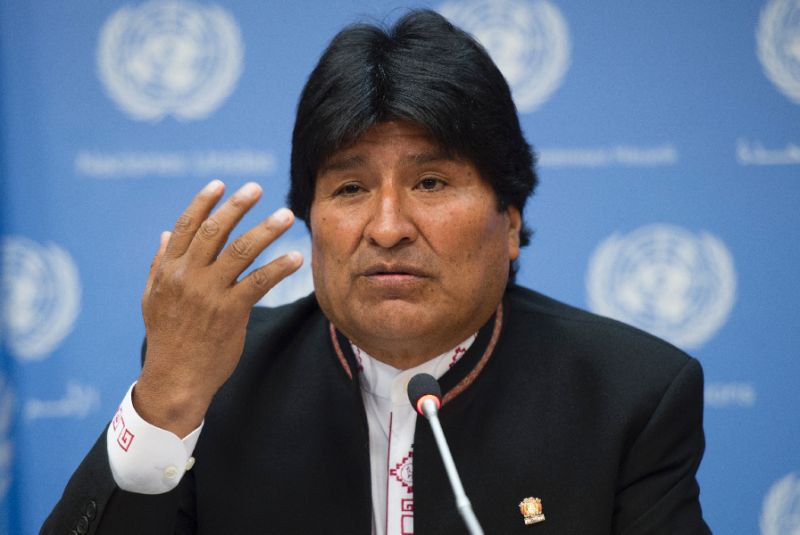
La Paz, Bolivia | AFP | Evo Morales broke down barriers when he became Bolivia’s first indigenous president in 2006, but his refusal to democratically give up power and his tumultuous exit cast a shadow over nearly 14 years of economic progress and poverty reduction.
Forced to resign after losing the support of Bolivia’s military, he slipped away into exile in Mexico Monday night on a Mexican military jet.
Morales could have retired with sky-high popularity and an enviable record had he respected the country’s constitution, which limits a president to two successive terms.
But the 60-year-old former union leader, Latin America’s longest serving president until his resignation under pressure Sunday, couldn’t bring himself to let go of power.
When he first came to office, Bolivia’s constitution only allowed for single presidential mandates but Morales successfully gained cross-party support to hold — and win — a referendum on a new constitution that increased the limit to two terms.
In 2016, he once again held a referendum to allow him to run for a third term. This time, Bolivians voted decisively against the extension.
Undeterred, the constitutional court — filled with Morales loyalists — a year later declared it Morales’ human right to stand again, regardless of the constitution.
“I don’t want to” run again, Morales claimed. “But I don’t want to disappoint my people.”
From that point his popularity started to suffer.
– Electoral fraud –
His undoing came in Bolivia’s presidential elections October 20.
The election appeared to be headed for a second round, albeit with Morales in the lead, when the count was inexplicably suspended.
When it started up again, Morales’ lead had jumped, suddenly giving him an outright first round victory.
His defeated opponent, former president Carlos Mesa, immediately cried foul and alleged electoral fraud.
That was supported by the Organization of American States, which conducted an audit of the vote count and found “irregularities” in virtually every area reviewed and questioned “the integrity of the election results.”
Morales initially acknowledged the fraud and called for new elections but neither the public nor the armed forces were satisfied.
General Williams Kaliman called on him to resign and Morales obliged, setting off a raft of resignations from many of his most prominent allies.
– Landmark gains –
A member of the Aymara people, Morales grew up in poverty on Bolivia’s high plains and was a llama herder, coca farmer and leftist union leader.
He became a lawmaker in 1995 and in 2002 launched a bid for the presidency, finishing second in the vote.
Four years later he defeated right-wing candidate Jorge Quiroga to make history as the country’s first indigenous leader.
Sitting on the region’s second-largest gas reserves, after Venezuela, and the world’s largest reserves of lithium, Bolivia’s economy surged under Morales.
He nationalized hydrocarbons in 2006, which coincided with an unprecedented global price boom, helping to propel economic growth to nearly five percent a year. Poverty dropped from 38 percent in 2005 to 17 percent last year, according to official figures.
He embarked on massive public works, laying more than 7,000 kilometers of roads and building the cable car that serves the seat of government in La Paz.
Rising foreign investment, particularly from China, helped Bolivia exploit its rich natural resources. It is on track to become the world’s fourth-largest producer of lithium by 2021.
However, long before the social unrest of recent weeks, opponents had accused Morales of tolerating corruption and investing in flashy infrastructure projects at the expense of health and education.
A case in point was his decision last year to move the government headquarters into a luxurious skyscraper in La Paz.
Environmentalists blame him for raging wildfires that destroyed more than four million hectares (10 million acres) of forest and grassland, saying legislation enacted under Morales encouraged wholesale deforestation in order to expand agricultural production.
It’s all a long way from a childhood herding llamas and helping his parents in the fields in a small, arid village in western Bolivia’s Oruro department.
“Until I was 14, I had no idea there was such a thing as underwear. I slept in my clothes… (which) my mother only removed for two reasons: to look for lice or to patch an elbow or a knee,” he wrote in a candid autobiography.
A fierce critic of the United States, Morales was a staunch ally of leftist governments in Cuba and Venezuela.
 The Independent Uganda: You get the Truth we Pay the Price
The Independent Uganda: You get the Truth we Pay the Price


